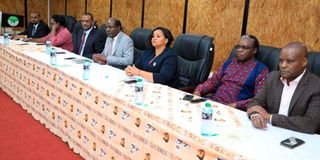Inside protracted battle to control IEBC

IEBC Chairman Wafula Chebukati (centre) and the electoral agency's commissioners during a meeting in Nairobi on August 22, 2022 at the Bomas of Kenya.
That every transitional period at the Independent Electoral and Boundaries Commission (IEBC) has been marked by controversies has become a norm for Kenyans and sections of the international community.
Constitutional lawyer Bob Mukangi, who was a member of the Committee of Experts (CoE) who wrote the 2010 Constitution, blames the transitional issues at the commission on vested interests. “Basically, it’s a case of own the referee, own the match,” says Mr Mukangi.
The law says that, at least six months before the expiry of the term of the chairperson or a member of the commission or within 14 days of the declaration of a vacancy in the office of the chairperson or member of the commission, the President shall appoint a selection panel. The panel shall consist of seven members.
In the next few days, IEBC should be having new commissioners after the terms of three of the seven-member commission — chairman Wafula Chebukati and members Boya Molu and Abdi Guliye — expire.
The three, together with Ms Connie Maina (vice chairperson), Mr Paul Kurgat, Ms Margaret Mwachanya and Dr Roselyn Akombe, who resigned in 2018 and 2017, had been appointed in January 2017 by former President Uhuru Kenyatta. This followed their nomination in December 2016. The exit of Ms Maina, Ms Mwachanya Mr Kurgat triggered vacancies for the recruitment of the other commissioners.
In the process, Ms Juliana Cherera, who went on to become the vice chairperson, Mr Justus Nyangaya, Francis Nyangaya and Ms Irene Masit, were recruited and appointed on September 2, 2021 by President Kenyatta. They were sworn-in 12 days later to serve for six years.
As fate would have it, Ms Cherera, Mr Nyangaya, Ms Masit and Mr Wanderi encountered a difficult period due to their position on the results of the August 9, 2022 presidential election.
The National Assembly adopted a report of its Committee on Justice and Legal Affairs recommending the formation of a tribunal to investigate them.
As the race to have new commissioners gets underway, the executive has proposed a Bill that seeks to amend the first schedule of the IEBC Act to change the composition of the selection panel that oversees the filling of vacant positions at the commission.
The IEBC (Amendment) Bill 2022, signed by Kikuyu MP Kimani Ichung’wah, the leader of majority in the National Assembly, seeks to reduce the current allocation of the Parliamentary Service Commission which nominates four of the seven members of the panel.
If passed, the Bill which has already undergone first reading in the House, will allow the Political Parties Liaison Committee and the Public Service Commission to each nominate one member to the panel.
“The selection panel shall consist of one man and one woman nominated by the Parliamentary Service Commission, one person nominated each by the Public Service Commission, one person nominated by the Political Parties Liaison Committee, Law Society of Kenya (LSK) and two persons nominated by the Inter-Religious Council of Kenya (IRCK),” the Bill reads.
The part which is targeted for amendment states that the selection panel shall consist of two men and two women nominated by the Parliamentary Service Commission, one person each nominated by LSK and two persons nominated by the IRCK.





